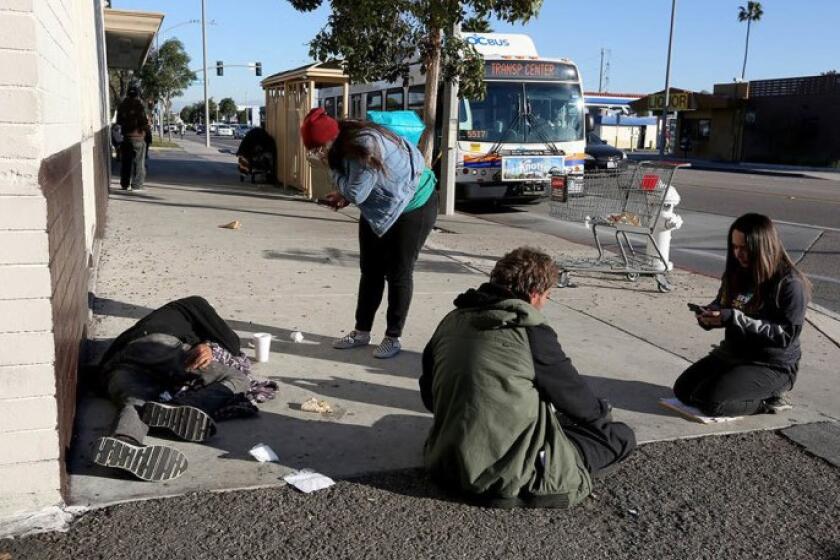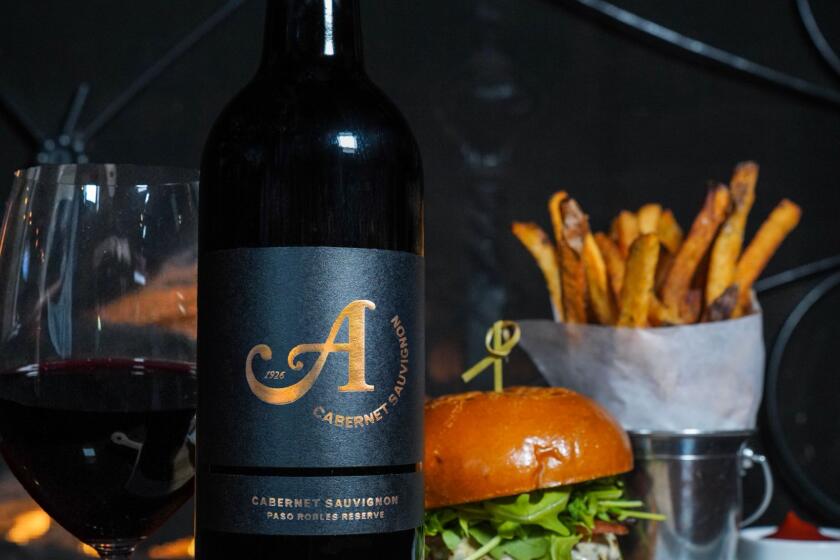In her debut poetry collection, Anatalia Vallez explores her roots as a Latina writer in O.C.
The first poem in Anatalia Vallez’s “the most spectacular mistake” is called “bond,” and it’s about honoring the generations of Mexican women who came before her.
“As a fetus my mother inhaled love,” it reads. “it lingered in her vocal chords / then traveled to her stomach / through her umbilical cord / and into me / it now lives between my stomach and diaphragm.”
“Perhaps that’s why I exist / to exhale what was trapped in my mother’s throat.”
Vallez, who is named after her great-grandmother, dedicates her debut poetry book “to all survivors of violence — may we reclaim our power and our narratives.”
“Para las mujeres que me rebozaron,” which follows, is a reference to the women, but also to the rebozo, the long, thick garment often worn by indigenous women in Mexico.
It can be used for warmth or fashion, or also to strap a child around a woman’s body. To Vallez, it’s a symbol of strength in the way it holds tight the most vulnerable and keeps them safe.
“As a Chicana, Latina writer, a lot of our poetry is about pain, heaviness and how we’re carrying this burden our family gave us — all the things that are woven that we need to unravel,” Vallez said. “But that doesn’t mean that the yarn isn’t useful. It’s about learning to see it in a different way, weaving something new that works for you and leaving behind what’s broken.”
Published by FlowerSong Press, the book is orchid-pink and filled with indigenous-inspired illustrations by John Jairo Valencia. Valencia and Vallez were classmates at UC Berkeley, and she loves that his artwork is so joyful and vibrant.
“The most spectacular mistake” is divided into four parts.
“Roots” is her expression of where she comes from: her family, the legends and the history that’s often not documented in textbooks.
“Core” represents the darker emotions that are often suppressed: the grit, the anger over injustice and the accompanying mental health struggles that are a part of the healing process.
“Heart” is her sentimental side: the ways she expresses different kinds of love.
And “Head” is the meditative ending: an attempt to integrate all these lessons and encapsulate her journey thus far as a young woman who identifies as Mexican American, Latina, Chicana, a poet, performer, playwright, and someone who has survived trauma but doesn’t want it to define her.
Some of her poems, including “bond,” are followed by Spanish translations, but she let the language dictate these decisions.
“Some pieces didn’t feel like they wanted to be translated, like it’d take away the essence of it,” she said. “It wouldn’t sound the same or evoke the same amount of feeling, so I wanted to honor that.”
Vallez grew up in Orange County speaking Spanish to her parents and grandparents, but it wasn’t until later that she could read or write confidently in the language. She remembers her schools discouraged speaking in Spanish, and she’s grateful for her older brother, who made her speak to him in Spanish at home.
“He knew English, but he wanted to hear it in Spanish,” she said. “He understood that because our parents don’t speak English, part of our connection would be lost if we don’t speak Spanish.”
Her poem “pero me entendiste” is about the mix of languages spoken in her household. Her grandparents also speak Nahuatl, an indigenous language often used in central Mexico.
“Pero me entendiste” explains that her grandfather only swears in Nahuatl and can order beer in English. The family has different ways to say “I love you very much:” te quiero mucho, te makti nimitzneki.
“The ways I was bullied for speaking Spanish, my grandma was bullied for speaking Nahuatl,” Vallez said. “The poem is talking about the ways that your language is mixed around and not ‘right.’ We speak Spanglish, variations of different languages, and are still able to understand each other.”
Vallez has been a writer and performer most of her life but didn’t always see a career in the arts as a possibility. As a teenager, she was in the first inaugural class of Barrio Writers,” a reading and writing program for teenagers in underserved communities started in Santa Ana by Sarah Garcia Rafael, local professor, writer and arts advocate behind Libromobile.
Since then, she’s written and performed with Orange County’s Breath of Fire Latina Theater Ensemble and Los Angeles’ Teada Productions, which creates theater about immigrants and refugees.
Debuting her first poetry collection in the midst of a pandemic, on April 1, while people were sheltering in place, was also not a part of Vallez’s plan.
But she’s always believed that the people who need to hear her poetry will find it, whether it’s a poems like “how to have a good cry“ and “for folks that are soft,” or “misogyny invites itself in with a joke” and “roundup,” a twist on the popular “99 bottles of beer” folk song that comments on the ways people in detention centers are rounded up and “snatched in plain sight.”
She’s also proud of the coming-of-age monologues in the book like “Y si no me quieren,” which translates to “And if they don’t want me.”
Much of her work is about the importance of self-care.
“I think the pandemic really shows us that we are all connected,” she said, noting how those who don’t feel free to travel right now can empathize with undocumented Americans and those feeling vulnerable to illness can now relate to her sister, who has an autoimmune disease.
So whether the timing is “a mistake” or not doesn’t matter.
“Ever since I was small, I’d feel the need to sit down and behave,” she said. “And that can be good, because teachers thought of me as a good student and you survive. But creativity and life is really better when you allow yourself to make mistakes. To know that this might not come the way I wanted it to, but at least I tried.”
As her poem “breaking patterns, leaving notes” reads: “If loving yourself is a mistake / let it be the most spectacular mistake you make.”
For more information, visit anataliavallez.com.
All the latest on Orange County from Orange County.
Get our free TimesOC newsletter.
You may occasionally receive promotional content from the Daily Pilot.




